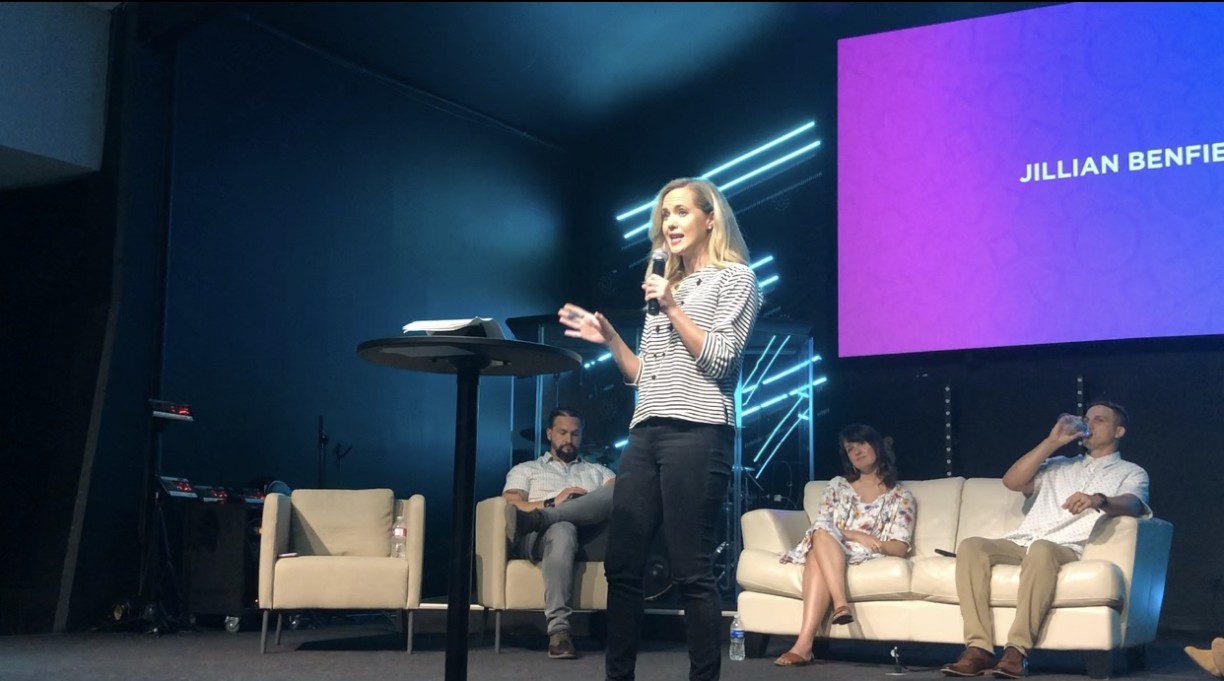Confronting toxic positivity in church. This short talk by Jillian Benfield takes a look at the Psalms and grieving well together.
Everyone goes through rough patches, right? It’s expected. My husband and I went through a rough half-a-decade. I only have 7 minutes to speak to you today, so I’m going to take you through 2014-2018 in 20 seconds. Okay? Here we go: We found out our unborn son had Down syndrome. We feel SO very differently about Down syndrome today, but we were devastated at the time, the next year our son had open heart surgery, the next year we had a miscarriage. Then we found out we are pregnant again, strong heartbeat, clear genetic test, then 2 days after we told our family and friends, doctors discovered our new unborn son’s stomach was twice the size of his head. Eventually, doctors diagnosed our son with posterior urethral valves, a very serious and sometimes fatal condition. I had to relocate to a Ronald McDonald house for a month without my family, so doctors could perform fetal intervention surgery on our son while I was in labor. We spent 10 days in the NICU, and we spent the first year of his life in and out of the hospital.
So, this talk is going to be a lot of fun. I want to talk about grieving well together.
I forgot to mention that the same son that had the fetal intervention surgery—just for an added bonus- also had bilateral clubbed feet. One day, we took him to church and a man asked me why our baby had full leg casts. I said, “He has clubbed feet. He also has kidney and urological issues- so we’re at the doctor a lot.” And he said to me, with a wave of his hand, “Oh, you’re blessed, you’re blessed.” You see, he just wanted information. He wanted me to focus on Jesus, the light in the situation, but he wasn’t willing to be the light himself. Probably not by intention, but what he did that day, was shame me for admitting my pain.
Turn to Psalm 13 or read along on the screen. Psalm 13, 1-4 says this:
How long, Lord? Will you forget me forever?
3 Look on me and answer, Lord my God.
Give light to my eyes, or I will sleep in death. . .
Did you know that more than half of the Psalms are laments like this one? But we don’t like to read these, we don’t like to talk about these or hear the preacher preach about these on Sunday. We are in an American culture and a church culture that wants and expects us to go from positive to positive. “Just think positively”, “stop complaining”, “move on.” But sometimes things are just dark. And what I discovered in our rough-half-a-decade is that when real darkness comes, when loss hits, when someone betrays, when a medical condition knocks you down to your knees—we have to sit in the darkness. I think of Jacob who wrestled with God, I think of Job who called out the injustice of his trials, I think of Jesus, who said on the cross—“my God, why have you forsaken me?” I think God himself is telling us something—he’s saying bring it all to me. I want a real relationship with you—which means- I want all of you.
The way I have seen God in the darkness, is by bringing him my unthinkable thoughts, by asking him—really? Why is this happening again? Couldn’t you step in this time? And it may not have changed my circumstances, but the more I threw at him, the more I started to see him.
Walter Brueggeman says this about the Psalms, “Because [the] One has promised to be in the darkness with us, we find the darkness strangely transformed, not by the power of easy light, but by the power of relentless solidarity.”
God himself is not the darkness, but he is in it with us. He is relentlessly present even when we cannot see. And if we give him all of us, he uses the darkness to transform us.
The last part of Psalm 13 says this:
But I trust in your unfailing love;
6 I will sing the Lord’s praise,
for he has been good to me.
The way we get to this transforming hope, the way we find our way out of the darkness, is by giving our all over to God. And church, we know through scripture that one of the primary ways God acts in the world is through us, his people. One way those in the dark start to see the light again is when his people sit in the dark pit with the hurting. Those of us above ground can’t reach down a hand into the pit to pull the other person up. It doesn’t work that way. We have to climb down, sit, and listen. Don’t offer up cheap Christian clichés and bad explanations. Don’t try to make them feel guilty over their grief. Let the grieved grieve. The Psalms tell a story of grief and then hope. So, Feel for them. Listen to them. Tell them, “I’m so sorry you are going through this.” Offer to lighten their load, with *specific services*: “Can I bring you dinner Tuesday?” “Can I watch the kids for you Saturday?” Don’t tell your hurting friends they are blessed or to look on the bright side. They feel isolated, forgotten, defeated. But when you climb down into the pit, when you cry out with them, your friend, your loved one, will slowly begin seeing the light again. Let’s do away with toxic positivity and instead be relentlessly present. We belong to one another, so let’s do all of life together, even the darkest parts. Let’s grieve well together.

Toxic positivity in church






